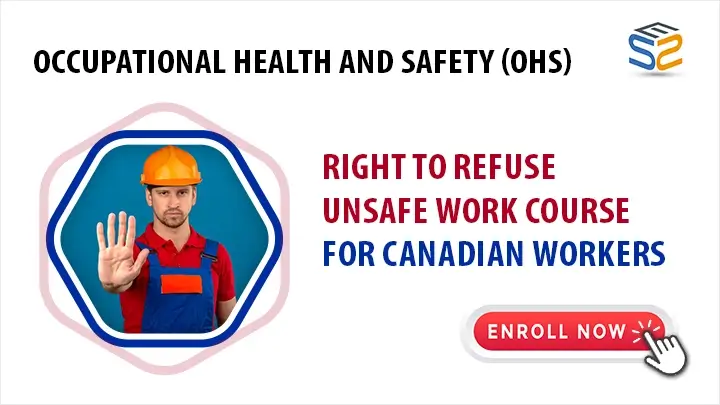Introduction
The right to refuse unsafe work is a fundamental part of Occupational Health and Safety (OHS) legislation. Canadian labor laws provide robust protections for workers, including the crucial right to refuse work that is unsafe. Despite these protections, many workers are either unaware of their rights or unsure how to exercise them effectively.
Our OHS – Work Refusal Training Course aims to empower Canadian workers to recognize unsafe work conditions and to take appropriate action to protect themselves and their colleagues, ensuring a safer working environment for all.
Why Take a Work Refusal Training Course?
.
1. Know Your Rights
Many workers are unaware of their legal rights when it comes to refusing unsafe work. Our OHS – Work Refusal Training Course provides a thorough understanding of the legal rights and responsibilities associated with refusing unsafe work. We cover Canadian workplace safety laws in detail, ensuring your employees are well-informed and prepared to act appropriately.
2. Enhance Workplace Safety
By understanding the protocols and procedures for refusing unsafe work, you contribute to a safer working environment for everyone. Our OHS – Work Refusal Training Course equips you with the skills to identify potential hazards and take appropriate action, fostering a culture of safety within your organization.
3. Boost Workers Confidence
Workers who are knowledgeable about their rights feel more secure and confident. Our OHS – Work Refusal Training Course offers practical advice and real-world scenarios that equip your team with the skills they need to handle unsafe work situations effectively.
4. Legal Protection
Ensure your business is compliant with Canadian occupational health and safety regulations. Our OHS – Work Refusal Training Course outlines the proper procedures for refusing unsafe work, helping you avoid potential legal issues and demonstrating your commitment to employee safety.
Our E-learning Course Highlights
.
1. Understanding the Right to Refuse Unsafe Work: Learn the legal foundations of the right to refuse unsafe work under Canadian law.
2. Identifying Unsafe Conditions: Gain practical skills to recognize hazards in the workplace that could compromise safety.
3. Effective Communication: Discover how to report unsafe conditions to supervisors and safety officers effectively.
4. Legal Protections and Responsibilities: Understand the protections afforded by the law and the responsibilities that come with exercising the right to refuse.
Why Choose Our Customize e-learning Course
Our Customized e-learning course for Work Refusal Training offers several advantages:
1. Consistent Training: Ensures that all employees receive the same information and training experience, which helps in maintaining uniformity in understanding and applying work refusal procedures.
2. Scalability: Easily scalable to accommodate a growing number of employees or to update content as new regulations or procedures arise.
3. Tracking and Reporting: Customized e-learning courses often include features for tracking progress and generating reports, which can help in monitoring compliance and assessing the effectiveness of the training.
4. Accessibility: Employees can access the training materials from anywhere with an internet connection, making it easier for remote or geographically dispersed teams to participate.
5. Certification: Upon completion, you’ll receive a certification that highlights your commitment to safety and compliance, enhancing your resume and giving you a competitive edge in the job market.
Overall, a customized e-learning course for Work Refusal Training can offer a more effective, flexible, and cost-efficient way to ensure that all employees understand their rights and responsibilities when it comes to refusing unsafe work.
Summary
Our OHS Work Refusal Training Course educates workers about their rights and responsibilities concerning unsafe work conditions, boosting confidence and ensuring adherence to Canadian safety laws.
Frequently Asked Questions (FAQs)
Q1: What is the Work Refusal Course for Workers?
Answer: The Work Refusal Course for Workers is designed to educate employees about their rights and responsibilities when they need to refuse unsafe work. The course covers procedures for reporting unsafe conditions, understanding worker rights, and ensuring compliance with occupational health and safety regulations.
Q2: Can you integrate existing training materials into the e-learning course?
Answer: Yes, we can integrate your existing training materials into the e-learning course. Whether you have documents, videos, or other resources, our team can incorporate them into a cohesive e-learning module. This allows you to leverage your current content while enhancing it with interactive features and multimedia.
Q3: What are the steps involved in converting PowerPoint presentations to e-learning modules?
Answer: The process of converting your existing Work Refusal PowerPoint presentations to e-learning modules involves several steps:
1. Assessment: Reviewing your existing PowerPoint slides to determine content and structure.
2. Design: Developing interactive elements, multimedia, and quizzes based on the original content.
3. Development: Converting the slides into e-learning modules with engaging features.
4. Testing: Ensuring the modules function correctly and are user-friendly.
5. Deployment: Launching the final e-learning modules for your learners.
Q4: How do your e-learning solutions address diverse learning styles in the Work Refusal Course?
Answer: Our e-learning solutions are designed to cater to various learning styles by incorporating a mix of interactive elements, multimedia, and practical scenarios. This approach ensures that the Work Refusal Course is engaging and effective for all types of learners, whether they prefer visual, auditory, or kinesthetic learning methods.
Q5. How do your translation and localization services benefit the Work Refusal Course for Workers?
Answer: Our translation and localization services enhance the Work Refusal Course by making it accessible to a multilingual workforce. We adapt course content to various languages and cultural contexts, ensuring that safety procedures and worker rights are accurately represented and relevant to all participants. This approach ensures effective training across diverse teams.




